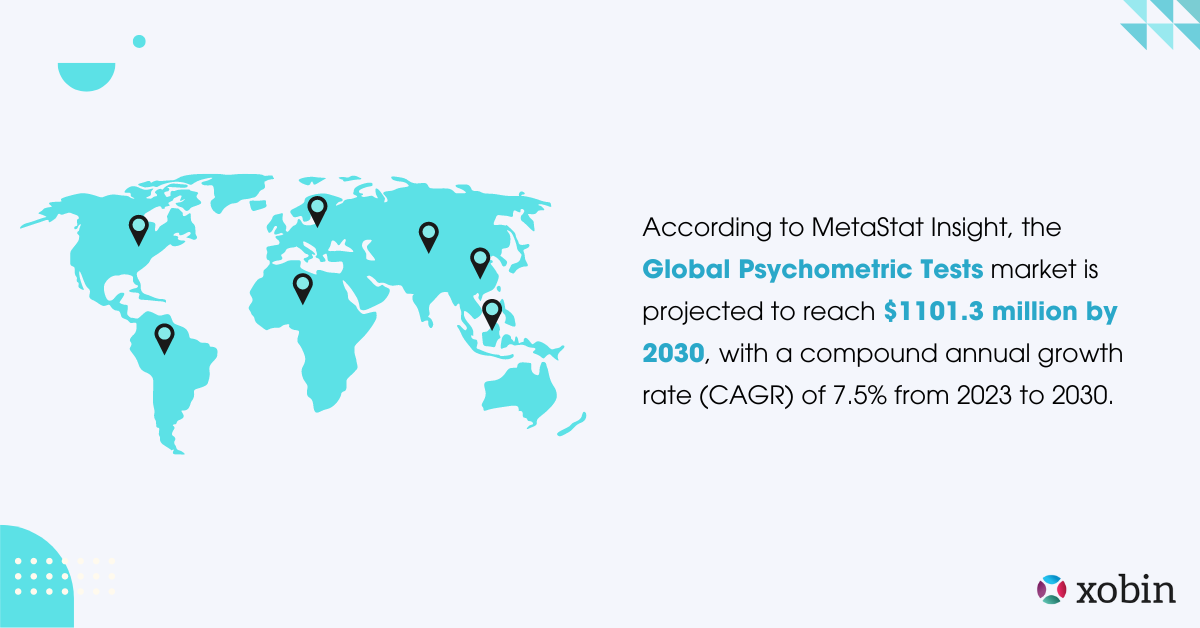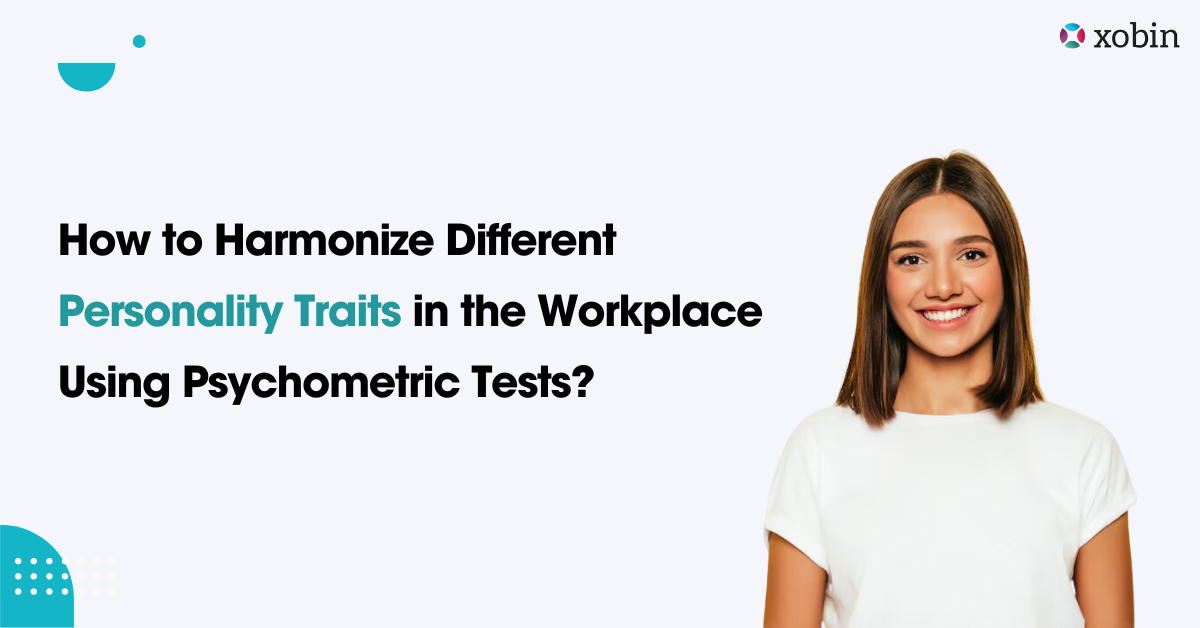The modern workplace is a melting pot of diverse personality characteristics. Harmonizing different personality traits is more crucial than ever for creating a productive and positive work environment. Xobin’s Psychometric Testing plays a crucial role in this process, providing insights into employees’ personalities and helping managers create balanced and harmonious teams. Each employee brings unique strengths and perspectives, contributing to a more prosperous, more innovative workplace. However, blending these diverse traits can be challenging. This blog will explore effective strategies to manage different personality traits in the workplace using psychometric tests, enhancing teamwork, creativity, and overall job satisfaction.
Table of Contents
Personality Traits Meaning
Personality traits are the distinctive characteristics and behaviors that define an individual’s patterns of thinking, feeling, and acting. These traits influence how people interact with others, approach problems, and handle various situations. Understanding personality traits is crucial for creating a harmonious workplace, as it helps in recognizing and appreciating the diversity of thought and behavior among employees. Commonly, these traits are categorized into five major dimensions: openness, conscientiousness, extraversion, agreeableness, and neuroticism. Each trait influences how an individual interacts with others and approaches work tasks.
What are the Different Types of Personality Traits?
Recognizing the foundational characteristics of a person is important to deal with in the workplace. These characteristics or traits vary among individuals and significantly influence their behavior and interactions. Understanding these five personality traits helps in identifying how different people might respond to various situations in the workplace and allows for better management of team dynamics. The big five personality traits, also known as OCEAN, include:
1. Openness to Experience
This trait features characteristics such as imagination, insight, and a willingness to try new things. People who are high in openness tend to be more creative and open to new experiences.
2. Conscientiousness
This trait reflects a person’s high levels of thoughtfulness, reasonable impulse control, and goal-directed behaviors. Individuals high in conscientiousness are often efficient and self-disciplined.
3. Extraversion
This trait includes sociability, talkativeness, assertiveness, high levels of emotional expressiveness, and excitability. Extroverts are typically outgoing and enjoy interacting with others.
4. Agreeableness
This trait includes attributes such as trust, altruism, kindness, and affection. People who score high on agreeableness are often cooperative and get along well with others.
5. Neuroticism
This trait is characterized by emotional instability, experiencing unpleasant emotions quickly, such as anger, anxiety, moodiness, irritability, depression, or vulnerability. Individuals high in neuroticism may experience more stress and negative emotions.
Utilizing Psychometric Tests to Identify and Address Personality Gaps

Psychometric tests are becoming increasingly essential in the workplace, with the market reflecting significant growth. According to MetaStat Insight, the Global Psychometric Tests market is projected to reach $1101.3 million by 2030, with a compound annual growth rate (CAGR) of 7.5% from 2023 to 2030. This surge in demand for psychometric assessments in hiring, promotion, and employee development processes is driving the market’s growth. Let’s take a look at how it helps identify and address the personality gaps.
Recognizing Personality Traits
One of the key advantages of psychometric assessment tests is its ability to identify distinct personality traits among employees. These traits include aspects such as introversion vs. extroversion, openness to experience, conscientiousness, and agreeableness. By analyzing these traits, organizations can gain a comprehensive understanding of their team members’ behavioral tendencies and working styles.
For instance, an employee who scores high in agreeableness and low in conscientiousness might be more collaborative but less detail-oriented. Conversely, an employee with high conscientiousness and lower agreeableness might focus on achieving goals but struggle with team collaboration. Recognizing these differences is the first step in harmonizing diverse personalities.
Common Personality Gaps
- Communication Styles: Differences in how individuals express ideas and feedback.
- Work Ethic and Motivation: Variations in commitment and drive.
- Conflict Resolution: Diverse approaches to handling disagreements.
How Do Psychometric Tests Help in Finding the Gap?
Once personality traits are identified, the next step is to address any gaps that may hinder workplace harmony. Psychometric tests provide a baseline for this analysis by highlighting potential mismatches between team members’ traits and their roles. Here are several ways organizations can use the information gathered:
Team Composition
Psychometric data can guide the formation of balanced teams by ensuring a mix of complementary traits. For instance, pairing high-extraversion individuals with those who are more introverted can create a dynamic and well-rounded team.
Role Alignment
Understanding individual traits allows for better alignment of roles and responsibilities. Employees can be assigned tasks that match their strengths, leading to improved performance and job satisfaction.
Conflict Resolution
Psychometric testing can uncover underlying reasons for conflicts, such as differing communication styles or work preferences. By addressing these issues with targeted strategies, organizations can foster a more harmonious work environment.
Personal Development
Insights from psychometric assessment tests can also inform personal development plans. Employees can receive tailored feedback and training to improve areas where their traits might not align with team expectations or organizational goals.
Benefits of Integrating Diverse Personality Traits in Workplace Using Psychometric Tests

Psychometric testing and assessments are valuable tools for understanding and harmonizing personality traits in the workplace. These tests provide insights into an individual’s personality, helping employers to:
Enhancing Team Dynamics
One of the primary benefits of using psychometric tests is enhancing team dynamics. When managers understand the personality characteristics of their team members, they can assign roles and responsibilities that align with each individual’s strengths. This alignment not only improves job satisfaction but also boosts overall team performance.
For instance, a team comprising diverse personality traits, such as analytical thinkers, creative minds, and strong communicators, can tackle complex problems more effectively. Each member brings a unique perspective, leading to more innovative solutions.
Promoting Employee Engagement and Retention
Employees who feel understood and valued are more likely to stay with an organization long-term. Psychometric testing can play a significant role in this by ensuring that employees are placed in roles that match their personality and skills. This alignment leads to higher job satisfaction, reduced stress, and increased employee engagement. Consequently, organizations benefit from lower turnover rates and a more stable workforce.
Facilitating Personal and Professional Growth
Another significant advantage of integrating psychometric tests is that they facilitate personal and professional growth. These tests provide valuable feedback to employees, helping them understand their strengths and areas for improvement. With this knowledge, employees can set targeted development goals and pursue relevant training opportunities.
For organizations, investing in the growth of their employees leads to a more skilled and adaptable workforce. It also demonstrates a commitment to employee development, which can enhance the company’s reputation and attract top talent.
Improving Hiring Decisions
Effective hiring decisions are crucial for building a strong workforce. Psychometric tests can improve the accuracy of these decisions by providing objective data on candidates’ personality traits and cognitive abilities. This data helps hiring managers identify individuals who are not only technically competent but also an excellent cultural fit for the organization.
Additionally, the tests can reduce the risk of unconscious bias in the hiring process. By relying on objective assessments, organizations can ensure a more equitable and inclusive hiring process.
Enhancing Leadership Development
Leadership development is another area where psychometric testing and assessments offer substantial benefits. Understanding the personality traits of potential leaders can help organizations identify individuals with the right qualities for leadership roles. These qualities include emotional intelligence, resilience, and the ability to inspire and motivate others. Furthermore, psychometric tests can inform leadership training programs by highlighting areas where individuals may need additional development. This targeted approach to leadership development ensures that future leaders are well-prepared to meet the challenges of their roles.
Fostering a Positive Workplace Culture
Integrating diverse personality traits through psychometric tests fosters a positive workplace culture. When employees feel understood and valued, they are more likely to collaborate effectively and contribute to a harmonious work environment. This inclusive culture not only enhances employee satisfaction but also attracts top talent who value diversity and inclusivity.
Strategies for Using Psychometric Tests to Harmonize Personality Traits in Workplace
Identifying Personality Traits
The first step in harmonizing personality traits is identifying them. Conducting comprehensive psychometric tests online for all employees provides a clear picture of their strengths, weaknesses, preferences, and behavioral tendencies. For example, the MBTI categorizes individuals into 16 different personality types based on four dichotomies: Introversion/Extraversion, Sensing/Intuition, Thinking/Feeling, and Judging/Perceiving. By gathering detailed information about each employee, organizations can identify potential areas of conflict and opportunities for collaboration.
Strategic Team Formation
Once personality traits are identified, strategic team formation becomes easier. Teams composed of diverse personalities are more innovative and effective. Psychometric assessment helps in forming balanced teams by ensuring a mix of complementary traits. For example, pairing a creative thinker with a detail-oriented individual can lead to innovative solutions that are both imaginative and practical. This approach not only enhances teamwork but also promotes mutual respect and understanding. Moreover, understanding team dynamics through various types of personality tests can prevent potential conflicts and enhance collaboration.
Conflict Resolution
Conflicts are inevitable in any workplace. However, understanding personality traits can significantly aid in conflict resolution. Psychometric tests provide insights into how individuals react under stress and what triggers their negative responses. With this knowledge, managers can mediate conflicts more effectively by addressing the root causes. For example, a dispute between a detail-oriented individual and a big-picture thinker can be resolved by acknowledging their different perspectives and finding a common ground.
Tailor Communication Style
Effective interaction is essential to a productive workplace. Use the psychometric analysis to tailor communication styles to suit individual preferences. For instance, some individuals prefer direct and concise communication, while others may appreciate a more empathetic and detailed approach. Adapting communication styles based on personality traits can significantly improve interactions and reduce misunderstandings.
Implement Personalized Development Plans
Personalized development plans are essential for nurturing employees’ growth and aligning their goals with organizational objectives. Psychometric tests provide valuable insights into employees’ learning styles and motivational factors. Use this information to design personalized development plans that cater to individual needs. Whether it’s providing additional training, mentoring, or opportunities for skill enhancement, customized plans can help employees reach their full potential and contribute positively to the workplace.
Enhance Leadership Effectiveness
Leaders play a pivotal role in shaping workplace harmony. Psychometric tests can identify potential leaders by highlighting traits such as emotional intelligence, decision-making ability, and resilience. By recognizing these traits early on, organizations can nurture future leaders through tailored development programs. Moreover, understanding the personality traits of team members allows leaders to adapt their management style to suit individual needs, fostering a positive work environment.
Promoting Inclusivity
Diversity and inclusivity are crucial for a harmonious workplace. Psychometric tests help in promoting inclusivity by highlighting the unique strengths of each individual. This encourages a culture of acceptance and respect, where differences are valued rather than seen as obstacles. Organizations can create an inclusive environment where everyone feels valued and motivated by leveraging the insights from psychometric tests.
Promote Emotional Intelligence
Emotional intelligence (EI) plays a crucial role in harmonizing personality traits. Employees with high EI can effectively navigate interpersonal relationships, manage conflicts, and exhibit empathy. Psychometric tests can assess employees’ emotional intelligence levels and identify areas for improvement. Organizations can then implement training programs focused on enhancing EI, fostering a culture of empathy, and promoting positive interactions among employees.
Continuous Assessment and Improvement
Harmonizing personality traits is an ongoing process. Continuous use of various types of psychometric tests ensures regular evaluation and improvement. Organizations should periodically re-evaluate their teams and make necessary adjustments to maintain harmony. This proactive approach helps in addressing any emerging issues and keeping the workforce aligned with organizational goals.
Conclusion
Psychometric tests are powerful tools for harmonizing different personality traits in workplace. By providing deep insights into employees’ characteristics, these tests help managers build balanced teams, enhance job satisfaction, and boost productivity. However, it’s essential to use these tests as part of a broader strategy that includes continuous learning, effective leadership, and open communication. With the right approach, psychometric assessments can transform workplace dynamics and create a harmonious and productive environment.






